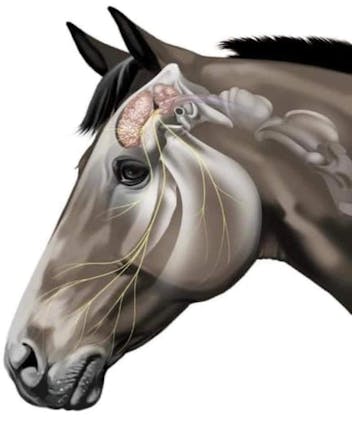the horses brain info...



Size and Complexity of a horses brain...
A horse's brain is relatively large compared to its body size, reflecting its intelligence and ability to process information. On average, a horse's brain weighs about 600 to 700 grams (1.3 to 1.5 pounds). While not as complex as the human brain, it is well-developed and capable of sophisticated cognitive functions.
what is Cerebral Hemispheres
Like humans and many other mammals, a horse's brain consists of two cerebral hemispheres, the left and right halves. Each hemisphere is responsible for controlling the opposite side of the body. The hemispheres are interconnected by a structure called the corpus callosum, which allows for communication and coordination between the two halves.
Cognitive Abilities...
Horses possess impressive cognitive abilities, including learning, problem-solving, and memory. They can quickly learn and remember specific tasks, navigate complex environments, and adapt to new situations. Horses are known for their ability to form strong social bonds and recognize individual humans and other animals.
Instincts and Survival...
Horses have well-developed survival instincts, which are deeply rooted in their evolutionary history as prey animals. They can quickly assess their surroundings, detect potential threats, and respond to danger through flight or fight responses. there Flight Response is One of the most prominent survival instincts of a horse is the "flight response." When horses perceive a threat or danger, their natural instinct is to flee from the potential danger. This response is deeply ingrained in their evolution as prey animals. Horses have an acute sense of hearing and sight, enabling them to detect even subtle changes in their environment, making them highly vigilant to potential threats.
Emotional Intelligence...
Horses are also highly emotionally intelligent animals. They can sense human emotions and respond to the emotional cues of their human handlers. This emotional connection often plays a significant role in building trust and cooperation between horses and humans. Sensing Human Emotions, Horses have the ability to sense and respond to human emotions. They can pick up on subtle cues and changes in a person's body language, tone of voice, and facial expressions. This heightened sensitivity allows them to perceive if a human is anxious, calm, fearful, or relaxed.
Brain and Behaviour...
The horse's brain is responsible for controlling various behaviours and bodily functions, including movement, communication, eating, and reproduction. The limbic system, located within the brain, plays a crucial role in regulating emotions and behaviour in horses. Temperament and Personality in an Individual differences in horse behaviour can be attributed, in part, to variations in their brain structure and function. Some horses may have bolder personalities, while others are more cautious and reserved. The horse's brain plays a role in determining their temperament and how they respond to various situations and stimuli.
Sleep Patterns...
Horses have unique sleep patterns due to their status as prey animals. They have a polyphasic sleep pattern, meaning they sleep in multiple short periods throughout the day and night. This adaptation allows them to be alert and responsive to potential threats even while resting.
Understanding the cognitive abilities and instincts of horses is essential for their proper training, handling, and overall welfare. Building a positive and trusting relationship with a horse is best achieved through patient and consistent interactions that respect their natural behaviors and intelligence.




